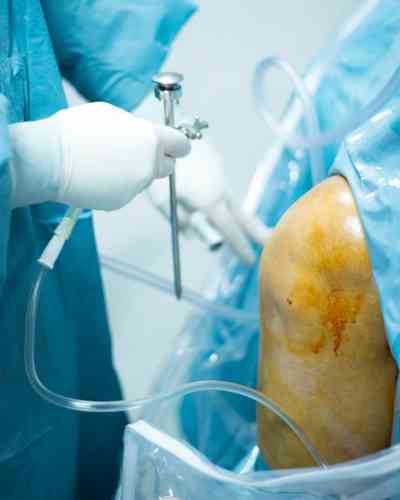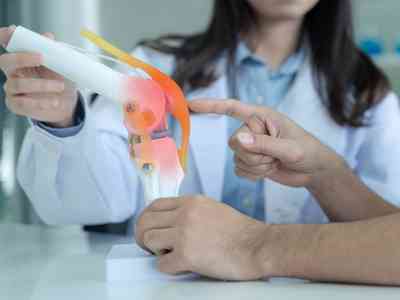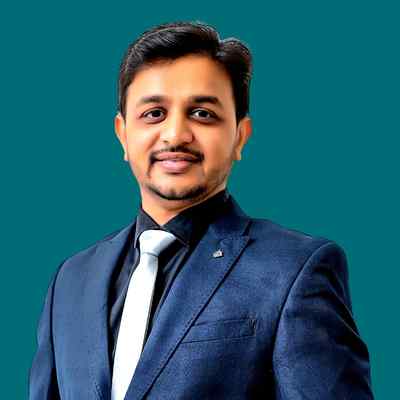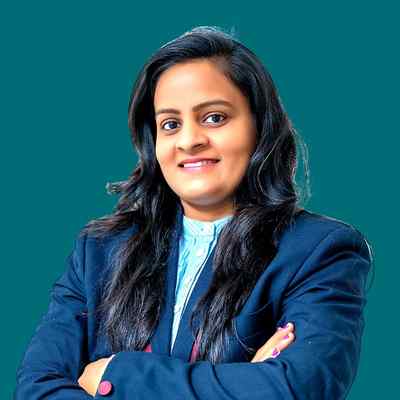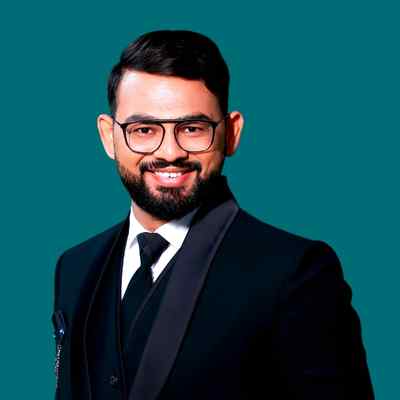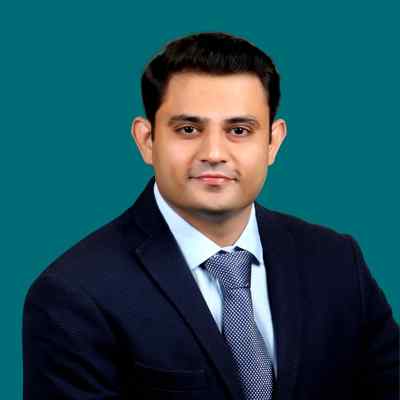Knee pain is the most common orthopedic problem in India. Our knee joint is the weight-bearing joint, and it is frequently prone to injury. Knee pain frequently cause us to become immobile and limit our capacity to move. At Nidhanam Orthopedics Speciality Center we provide all types of treatments for knee pain. Dr. Hiren Jadvani is the best knee surgeon for the knee pain treatment in Surat.
Osteoarthritis of the knee is the most common cause of pain, swelling in senior citizen. Due to wear & tear throughout the life the cushioning of the joint i.e. cartilage tissue of the knee joint gets soften and inflamed. This requires partial or complete knee replacement surgery. Nidhanam Orthopedics Speciality Center offers best knee replacement surgery options in Surat.
Sudden knee discomfort can be caused by a sports injury or a traumatic injury, which can be mild or severe. In many accidental injuries of athletes or road traffic accidents, knee joint ligaments, menisci are affected severely which require immediate repair. Arthroscopy provides the best result is these cases. Dr. Hiren Jadvani is a renowned arthroscopy specialist in Surat.
Anterior Knee Pain
Osteoarthritis of Knee
Anterior Cruciate Ligament (ACL) tear
Posterior Cruciate Ligament (PCL) tear
Meniscus Injury
Multi-ligament Injury
Patellar Instability
Cartilage Injury
Osteochondritis Dessicans
Quadriceps tendon Rupture
Patellar tendon Rupture
Patellar Tendinitis/ Tendinopathy (Jumper’s Knee)
Runner’s Knee
Rheumatoid Arthritis, Runner’s Knee
Bursitis
Ligament Surgeries
Primary ACL Repair
ACL/PCL Avulsion Fixation
ACL Augmentation/Reconstruction
Lateral Extra-articular Tenodesis
MCL Repair/Anatomic Reconstruction
PLC (Laprade’s/Larson’s) Reconstruction
Cartilage Restoration
Micro fracturing
Osteochondral Autograft Transfer (OATS)
Autologous Chondrocyte Implantation
Meniscus Repair
Balancing Para-meniscal Cyst Decompression
Synovial Sampling and Synovectomy
Popliteal Cyst Decompression
Ganglion Cyst Decompression
High Tibial Osteotomy
Proximal Fibular Osteotomy
Partial Knee Replacement
Total Knee Replacement
Navigated Knee Replacement
MPFL Reconstruction
Tibial Tubercle Transfer
Trochleoplasty
Patello-femoral Replacement
Single or multi-level Femoral Osteotomy
Single or multi-level Tibial Osteotomy
Growth Modulation
Hemi-Epiphysiodesis
Complex Multi-ligament Reconstruction
Knee Dislocation Management
Proximal Tibia Fractures
Distal Femoral Fractures
Patellar Fractures
Repair. Replace. Revive.
Expert Doctors
Frequently Asked Questions
Arthroscopic surgery is a type of minimally invasive surgery that requires only small incisions thanks to a device known as an arthroscope. It lets your surgeon see inside the joints and view the specific area being worked on during surgery without the need for large incisions.
Arthroplasty is the reconstruction or replacement of a joint such as a shoulder, elbow, wrist, hip, knee or ankle. Depending on the extent of the joint injury or condition, you may need partial or total arthroplasty.
Like human bone, the prosthetic devices used in joint replacement surgery can become damaged or simply wear out. If you’ve previously had partial or total joint replacement surgery but need to have the joint operated on again, it’s considered revision surgery.
Advances in medical technologies — including the prosthetic materials used in total and partial hip, knee, elbow and shoulder joints — continue to extend the life expectancy of artificial joints. Generally speaking, today’s prosthetic devices can last upwards of 15-20 years. Factors that can impact the durability of prosthetics include your activity level, overall health, weight and whether you have arthritis.
While the goal of surgery is to restore function and get you moving without pain, there are usually some limitations after orthopedic surgery. Talk to your orthopedic surgeon about realistic expectations after surgery.
There’s no one-size-fits-all answer for deciding when to have surgery. Your orthopedic surgeon or other doctors will help you determine when surgery is the most appropriate next step. Key considerations include whether you’re in pain, if you’re experiencing instability or decreased mobility, and whether the injury or condition is affecting your quality of life.
For first consult, patient will be evaluated with detailed history and clinical examination before he/she is advised suitable imaging. Additionally, it will be helpful to bring along previous X-rays and scans especially related to fractures and for comparative assessment.
A fracture is a broken bone. A sprain occurs when you injure the ligaments that connect your bones.
For most of the patients, average stay after surgery is between 2-5 days, depending on the type of surgery. Discharge is planned when medical condition is stable, pain is adequately controlled with oral medications, able to eat and urinate and when physical and occupational goals are successfully met. Bracing, rehabilitation and after surgery instructions will be provided to the patient at discharge.
Following discharge after surgery, you are required to contact the physiotherapist who will help in optimum post-operative recovery. At Nidhanam Orthopedics Speciality Center we have consultant physiotherapist and rehab expert in our team of doctors to ensure smooth rehabilitation and recovery.





